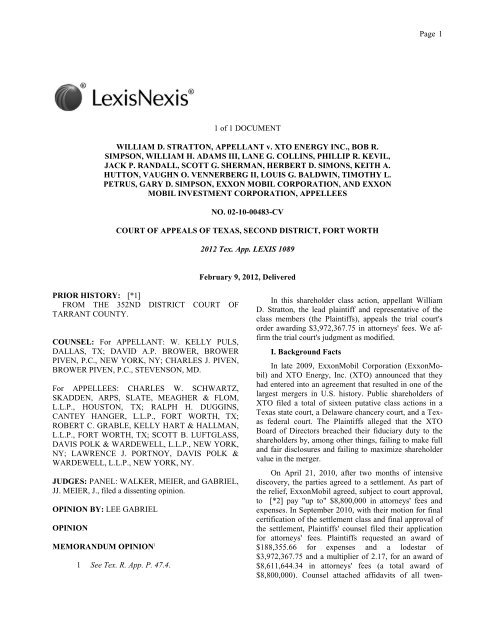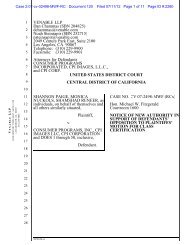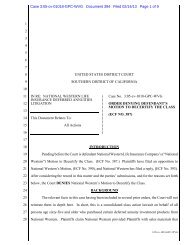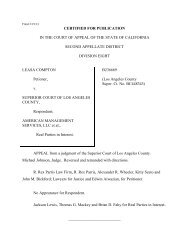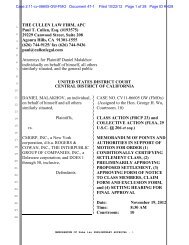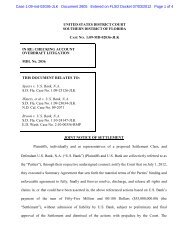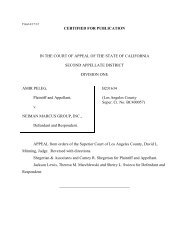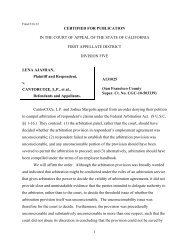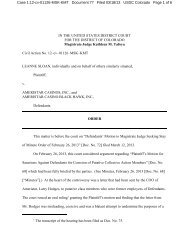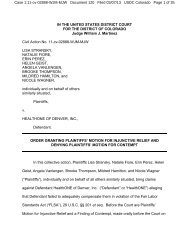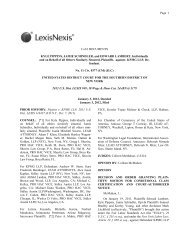here - Impact Litigation Journal
here - Impact Litigation Journal
here - Impact Litigation Journal
Create successful ePaper yourself
Turn your PDF publications into a flip-book with our unique Google optimized e-Paper software.
Page 1<br />
1 of 1 DOCUMENT<br />
WILLIAM D. STRATTON, APPELLANT v. XTO ENERGY INC., BOB R.<br />
SIMPSON, WILLIAM H. ADAMS III, LANE G. COLLINS, PHILLIP R. KEVIL,<br />
JACK P. RANDALL, SCOTT G. SHERMAN, HERBERT D. SIMONS, KEITH A.<br />
HUTTON, VAUGHN O. VENNERBERG II, LOUIS G. BALDWIN, TIMOTHY L.<br />
PETRUS, GARY D. SIMPSON, EXXON MOBIL CORPORATION, AND EXXON<br />
MOBIL INVESTMENT CORPORATION, APPELLEES<br />
NO. 02-10-00483-CV<br />
COURT OF APPEALS OF TEXAS, SECOND DISTRICT, FORT WORTH<br />
2012 Tex. App. LEXIS 1089<br />
February 9, 2012, Delivered<br />
PRIOR HISTORY: [*1]<br />
FROM THE 352ND DISTRICT COURT OF<br />
TARRANT COUNTY.<br />
COUNSEL: For APPELLANT: W. KELLY PULS,<br />
DALLAS, TX; DAVID A.P. BROWER, BROWER<br />
PIVEN, P.C., NEW YORK, NY; CHARLES J. PIVEN,<br />
BROWER PIVEN, P.C., STEVENSON, MD.<br />
For APPELLEES: CHARLES W. SCHWARTZ,<br />
SKADDEN, ARPS, SLATE, MEAGHER & FLOM,<br />
L.L.P., HOUSTON, TX; RALPH H. DUGGINS,<br />
CANTEY HANGER, L.L.P., FORT WORTH, TX;<br />
ROBERT C. GRABLE, KELLY HART & HALLMAN,<br />
L.L.P., FORT WORTH, TX; SCOTT B. LUFTGLASS,<br />
DAVIS POLK & WARDEWELL, L.L.P., NEW YORK,<br />
NY; LAWRENCE J. PORTNOY, DAVIS POLK &<br />
WARDEWELL, L.L.P., NEW YORK, NY.<br />
JUDGES: PANEL: WALKER, MEIER, and GABRIEL,<br />
JJ. MEIER, J., filed a dissenting opinion.<br />
OPINION BY: LEE GABRIEL<br />
OPINION<br />
MEMORANDUM OPINION 1<br />
1 See Tex. R. App. P. 47.4.<br />
In this shareholder class action, appellant William<br />
D. Stratton, the lead plaintiff and representative of the<br />
class members (the Plaintiffs), appeals the trial court's<br />
order awarding $3,972,367.75 in attorneys' fees. We affirm<br />
the trial court's judgment as modified.<br />
I. Background Facts<br />
In late 2009, ExxonMobil Corporation (ExxonMobil)<br />
and XTO Energy, Inc. (XTO) announced that they<br />
had entered into an agreement that resulted in one of the<br />
largest mergers in U.S. history. Public shareholders of<br />
XTO filed a total of sixteen putative class actions in a<br />
Texas state court, a Delaware chancery court, and a Texas<br />
federal court. The Plaintiffs alleged that the XTO<br />
Board of Directors breached their fiduciary duty to the<br />
shareholders by, among other things, failing to make full<br />
and fair disclosures and failing to maximize shareholder<br />
value in the merger.<br />
On April 21, 2010, after two months of intensive<br />
discovery, the parties agreed to a settlement. As part of<br />
the relief, ExxonMobil agreed, subject to court approval,<br />
to [*2] pay "up to" $8,800,000 in attorneys' fees and<br />
expenses. In September 2010, with their motion for final<br />
certification of the settlement class and final approval of<br />
the settlement, Plaintiffs' counsel filed their application<br />
for attorneys' fees. Plaintiffs requested an award of<br />
$188,355.66 for expenses and a lodestar of<br />
$3,972,367.75 and a multiplier of 2.17, for an award of<br />
$8,611,644.34 in attorneys' fees (a total award of<br />
$8,800,000). Counsel attached affidavits of all twen-
2012 Tex. App. LEXIS 1089, *<br />
Page 2<br />
ty-one law firms attesting to the work done by each firm<br />
and the hours and rates of their attorneys, and the affidavit<br />
of William Kelly Puls, which detailed the history of<br />
the action, including the negotiations that lead to the settlement,<br />
the terms of the settlement, and the benefits to<br />
Plaintiffs. Because the request was within the range<br />
agreed upon in the settlement, the defendants did not<br />
object.<br />
After a hearing in which no live witnesses or other<br />
additional evidence were presented, the trial court issued<br />
its final judgment granting Plaintiffs' request for<br />
$188,355.66 for expenses, but awarding only<br />
$3,972,367.75 of the requested $8,611,644.34 for attorneys'<br />
fees. The trial court issued a letter "to clarify some<br />
[*3] of the reasons for the court's ruling." In it, the trial<br />
court noted several problems with the evidence supporting<br />
the award. Specifically, the trial court noted a lack<br />
evidence that the hours worked and rates billed were<br />
reasonable. The trial court also expressed concern that<br />
some of the factors to be considered in granting a multiplier<br />
"would not be appropriate across the board" because<br />
of the firms' differences in size, location, specialization,<br />
and degree of involvement with the case. The trial<br />
court concluded,<br />
[D]espite the concerns set forth above<br />
regarding the sufficiency of the evidence<br />
and gaps in proof, the court accepted the<br />
billed amounts as the lodestar on the assumption<br />
that the Johnson factors have<br />
already been applied to justify the unusually<br />
high rates and declined to increase<br />
that amount by any multiplier.<br />
Plaintiffs filed a motion to modify the judgment and<br />
to supplement the record. They attached twenty-one affidavits<br />
from Plaintiffs' counsel attesting to the reasonableness<br />
of their respective firms' rates; an affidavit from<br />
Professor Geoffrey P. Miller, an expert on attorneys' fees<br />
in class actions; and an affidavit from Professor Arthur<br />
R. Miller, a member of the [*4] Advisory Committee<br />
on Civil Rules of the Judicial Conference of the United<br />
States. At a hearing on the motion to modify, Plaintiffs<br />
presented live testimony by Professor Geoffrey Miller<br />
and Craig Enoch and submitted an exhibit comparing the<br />
rates of Plaintiffs' counsel with other firms in Texas and<br />
nationwide. The trial court took no action on Plaintiffs'<br />
motion and it was denied by operation of law. The trial<br />
court did not file findings of fact and conclusions of law.<br />
See Tex. R. Civ. P. 42(h)(3). Plaintiffs then filed this appeal.<br />
II. Standard of Review<br />
In Texas, the amount of an attorneys' fee award in a<br />
class action is at the sound discretion of the court, which<br />
determines what is reasonable under the circumstances.<br />
See Cnty. of Dallas v. Wiland, 124 S.W.3d 390, 403 (Tex.<br />
App.--Dallas 2003), rev'd and remanded on other<br />
grounds, 216 S.W.3d 344 (Tex. 2007). To determine<br />
whether a trial court abused its discretion, we must decide<br />
whether the trial court acted without reference to<br />
any guiding rules or principles; in other words, we must<br />
decide whether the act was arbitrary or unreasonable.<br />
Low v. Henry, 221 S.W.3d 609, 614 (Tex. 2007); Cire v.<br />
Cummings, 134 S.W.3d 835, 838-39 (Tex. 2004). [*5]<br />
An appellate court cannot conclude that a trial court<br />
abused its discretion merely because the appellate court<br />
would have ruled differently in the same circumstances.<br />
E.I. du Pont de Nemours & Co. v. Robinson, 923 S.W.2d<br />
549, 558 (Tex. 1995); see also Low, 221 S.W.3d at 620.<br />
An abuse of discretion does not occur when the trial<br />
court bases its decisions on conflicting evidence and<br />
some evidence of substantive and probative character<br />
supports its decision. Unifund CCR Partners v. Villa, 299<br />
S.W.3d 92, 97 (Tex. 2009); Butnaru v. Ford Motor Co.,<br />
84 S.W.3d 198, 211 (Tex. 2002).<br />
III. Discussion<br />
In their third issue, Plaintiffs complain that the trial<br />
court abused its discretion by failing to apply the lodestar<br />
enhancement factors in determining the reasonableness<br />
of their request for attorneys' fees.<br />
Texas Rule of Civil Procedure 42(i)(1) states<br />
In awarding attorney fees, the court<br />
must first determine a lodestar figure by<br />
multiplying the number of hours reasonably<br />
worked times a reasonable hourly rate.<br />
The attorney fees award must be in the<br />
range of 25% to 400% of the lodestar figure.<br />
In making these determinations, the<br />
court must consider the factors specified<br />
in Rule 1.04(b), Tex. Disciplinary [*6]<br />
R. Prof. Conduct.<br />
Tex. R. Civ. P. 42(i)(1). Those factors are:<br />
(1) the time and labor required, the<br />
novelty and difficulty of the questions involved,<br />
and the skill requisite to perform<br />
the legal service properly;<br />
(2) the likelihood, if apparent to the<br />
client, that the acceptance of the particular<br />
employment will preclude other employment<br />
by the lawyer;
2012 Tex. App. LEXIS 1089, *<br />
Page 3<br />
(3) the fee customarily charged in the<br />
locality for similar legal services;<br />
(4) the amount involved and the results<br />
obtained;<br />
(5) the time limitations imposed by<br />
the client or by the circumstances;<br />
(6) the nature and length of the professional<br />
relationship with the client;<br />
(7) the experience, reputation, and<br />
ability of the lawyer or lawyers performing<br />
the services; and<br />
(8) whether the fee is fixed or contingent<br />
on results obtained or uncertainty<br />
of collection before the legal services<br />
have been rendered.<br />
Tex. Disciplinary Rules Prof'l Conduct R. 1.04(b), reprinted<br />
in Tex. Gov't Code Ann., tit. 2, subtit. G, app. A,<br />
art. 10 § 9 (West Supp. 2011). The factors are very similar,<br />
but not identical, to the factors articulated in Johnson<br />
v. Georgia Highway Express, Inc., 488 F.2d 714, 717-19<br />
(5th Cir. 1974). 2<br />
2 The Johnson factors are: (1) the time and<br />
[*7] labor required for the litigation; (2) the novelty<br />
and difficulty of the questions presented; (3)<br />
the skill required to perform the legal services<br />
properly; (4) the preclusion of other employment<br />
by the attorney due to acceptance of the case; (5)<br />
the customary fee; (6) whether the fee is fixed or<br />
contingent; (7) time limitations imposed by the<br />
client or the circumstances; (8) the amount involved<br />
and the result obtained; (9) the experience,<br />
reputation and ability of the attorneys; (10)<br />
the "undesirability" of the case; (11) the nature<br />
and length of the professional relationship with<br />
the client; and (12) awards in similar cases.<br />
Johnson, 488 F.2d at 717-19. Plaintiffs' counsel<br />
and the trial court refer to the Rule 1.04(b) factors<br />
and the Johnson factors interchangeably. Because<br />
they are so similar, we will do the same and will<br />
rely on cases applying the Johnson factors.<br />
In its letter, the trial court expressed concern that<br />
"many of the hourly rates charged seemed excessive on<br />
their face." It stated that in order for the trial court to<br />
consider the high rates to be reasonable, "Johnson factors<br />
would have to be applied to the rates themselves." It then<br />
explained that its award of attorneys' [*8] fees was "on<br />
the assumption that the Johnson factors have already<br />
been applied" to the lodestar.<br />
Texas law is clear that the trial court is required to<br />
complete two distinct steps in awarding attorneys' fees.<br />
First, the court must calculate the lodestar by multiplying<br />
the number of hours reasonably worked by a reasonable<br />
hourly rate. Tex. R. Civ. P. 42(i)(1). Some Johnson factors<br />
may be used to determine the lodestar. Guity v.<br />
C.C.I. Enter., Co., 54 S.W.3d 526, 529 (Tex.<br />
App.--Houston [1st Dist.] 2001, no pet.) (citing Shipes v.<br />
Trinity Indus., 987 F.2d 311, 320 (5th Cir. 1993)). Second,<br />
the court must apply a multiplier between .25 and<br />
4.0 based on any Johnson factors not already considered<br />
in the lodestar. Tex R. Civ. P. 42(i)(1); see Dillard Dep't<br />
Stores, Inc. v. Gonzales, 72 S.W.3d 398, 412 (Tex.<br />
App.--El Paso 2002, pet. denied) ("If some of [the Johnson]<br />
factors are accounted for in the lodestar amount,<br />
they should not be considered when making adjustments.").<br />
Considering the record as a whole and the trial<br />
court's explanation in its letter, it appears that the trial<br />
court did not complete the required steps. 3 Particularly, in<br />
view of the clear, direct, and uncontradicted evidence<br />
[*9] presented in support of the motion to modify the<br />
judgment, Plaintiffs met their burden of showing an adjustment<br />
was needed to arrive at a reasonable fee. Instead<br />
of calculating the lodestar itself based on what it determined<br />
to be the reasonable amount of hours worked and<br />
a reasonable rate for those hours, and then determining<br />
whether the Johnson factors warranted an increase or a<br />
decrease of that amount, the trial court "assumed" that<br />
the Johnson factors were accounted for in Plaintiffs' calculation.<br />
Although the letter does not make clear what<br />
value the trial court placed on each Johnson factor, it is<br />
clear, after considering the letter in conjunction with the<br />
complete record, that the trial court ignored the uncontroverted<br />
evidence that (1) the suggested lodestar was<br />
calculated without enhancement by the Johnson factors<br />
and (2) that an enhancement was warranted by the facts<br />
of the case. The trial court's assumption was not based on<br />
the evidence presented, was without reference to the<br />
guiding rules and principles, and resulted in an award<br />
that cannot be said to be just. 4 Because the trial court did<br />
not follow the steps as articulated in rule 42(i)(1), it<br />
abused its discretion by [*10] failing to calculate an<br />
appropriate lodestar and adjusting it as warranted. See<br />
Forbush v. J.C. Penney Co., 98 F.3d 817, 823 (5th Cir.<br />
1996) (holding that it would not reverse the decision of a<br />
court that fails to discuss a Johnson factor "so long as the<br />
record clearly indicates that the district court has utilized<br />
the Johnson framework as the basis of its analysis, has<br />
not proceeded in a summary fashion, and has arrived at<br />
an amount that can be said to be just compensation")<br />
(quoting Cobb v. Miller, 818 F.2d 1227, 1232 (5th Cir.<br />
1987)); Copper Liquor, Inc. v. Adolph Coors Co., 624<br />
F.2d 575, 584 (5th Cir. 1980) (noting that "we should go<br />
slow in finding that" a trial judge abused his discretion
2012 Tex. App. LEXIS 1089, *<br />
Page 4<br />
but holding that "the district court abused its discretion<br />
by failing to attach appropriate significance to the Johnson<br />
criteria most pertinent to reasonable attorneys' fees<br />
and by neglecting to develop fully the reasons for his<br />
award").<br />
3 As the dissent points out, the trial court's letter<br />
states that it "should not be considered an exhaustive<br />
or complete discussion of all considerations<br />
given to the Motion for Final Certification<br />
prior to the court's ruling t<strong>here</strong>on," and it was not<br />
intended [*11] to be findings of facts and conclusions<br />
of law. It is, however, the only insight in<br />
the record into the court's reasons for its judgment<br />
and we consider it for what usefulness it<br />
provides.<br />
4 Plaintiffs' fourth issue challenges the award<br />
as failing to consider the undisputed evidence that<br />
the requested amount was reasonable. As we<br />
stated above, we agree that the trial court ignored<br />
the uncontroverted evidence on the reasonableness<br />
of the requested award. Thus, we could alternatively<br />
reverse the award on the grounds asserted<br />
in Plaintiffs' fourth issue.<br />
The dissent would have us remand the case for further<br />
proceedings. In this case, however, we do not think<br />
remand is necessary. See Tex. R. App. P. 43.3 ("When<br />
reversing a trial court's judgment, the court must render<br />
the judgment that the trial court should have rendered,<br />
except when: (a) a remand is necessary for further proceedings<br />
. . . ."). The record before us contains all of the<br />
affidavits and records submitted in support of the request<br />
for attorneys' fees, and the testimony presented was not<br />
contradicted by any other witness or attendant circumstances<br />
but instead was clear, positive, and free from<br />
circumstances tending to cast suspicion [*12] t<strong>here</strong>on.<br />
In the interest of judicial economy and our duty to render<br />
judgment unless remand is necessary, we review the evidence<br />
and render the appropriate judgment. See id.;<br />
Ragsdale v. Progressive Voters League, 801 S.W.2d 880,<br />
882 (Tex. 1990) (rendering a judgment on attorneys' fees<br />
"[i]n the interest of judicial economy"); see also Louisiana<br />
Power & Light Co. v. Kellstrom, 50 F.3d 319,<br />
325-26 (5th Cir. 1995) (choosing to exercise its option to<br />
modify an award of attorneys' fees "[b]ecause the record<br />
contains sufficient information to allow a fair determination<br />
of a reasonable fee"); Sidag Aktiengesellschaft v.<br />
Smoked Foods Prods. Co., 960 F.2d 564, 566-67 (5th<br />
Cir. 1992) (rendering instead of remanding when sufficient<br />
evidence existed in the record because "no useful<br />
purpose would be served by further delaying [the case's]<br />
final disposition, not to mention exposing the parties and<br />
this court to yet [another] appeal").<br />
A. Calculating the lodestar<br />
The lodestar is calculated by multiplying the number<br />
of hours reasonably spent by counsel on the matter by a<br />
reasonable hourly rate. Dillard Dep't Stores, 72 S.W.3d<br />
at 412; Guity, 54 S.W.3d at 528-29. Plaintiffs submitted<br />
roughly 7,370 hours [*13] at various rates from $200 to<br />
$845 per hour for a lodestar of $3,972,367.75. We will<br />
review the evidence supporting both the number of hours<br />
and the hourly rates requested.<br />
1. Hours<br />
With their application for attorneys' fees, Plaintiffs'<br />
counsel presented no evidence in the twenty-one attached<br />
affidavits by the attorneys that their hours or their rates<br />
were reasonable. With their motion to modify, Plaintiffs<br />
submitted twenty more affidavits from the attorneys. 5 In<br />
all but five of those affidavits, the attorneys testified that<br />
the hours spent by their firm on the case were reasonable<br />
and necessary. 6 All of the firms detailed in their affidavits<br />
the tasks that the attorneys accomplished, such as<br />
researching, drafting, and filing; reviewing documents;<br />
responding to discovery requests; conducting depositions;<br />
and negotiating the settlement.<br />
5 One firm that had submitted an affidavit with<br />
the application did not submit a second affidavit<br />
with the motion to modify.<br />
6 Of the 7,369.9 hours submitted, the number<br />
of hours without direct testimony supporting their<br />
reasonableness and necessity equaled 386.35, or<br />
5.2% of the total hours submitted.<br />
Plaintiffs also submitted the affidavits of expert<br />
witness [*14] Geoffrey P. Miller. 7 Miller and Craig<br />
Enoch also testified at trial. In his affidavit, Miller<br />
opined that based on his review of the hours billed by the<br />
attorneys, "[t]he hours spent appear reasonable for the<br />
tasks accomplished." He further stated, "Considering the<br />
huge amount of work done as described in the submissions<br />
in support of the fee application, this time is, in my<br />
experience, consistent with the time needed to properly<br />
litigate a case of this type and magnitude." He noted that<br />
"expertise of the Plaintiffs' firms contributed to efficiency<br />
and reduced hours" and that,<br />
W<strong>here</strong> practical and appropriate, work<br />
appears to have been performed by associates,<br />
paralegals[,] and law clerks. By<br />
far, the overwhelming bulk of the work<br />
was done by attorneys with the appropriate,<br />
but not excessive, seniority to handle<br />
level-appropriate aspects of the Actions.<br />
In sum, based on my review of the affidavits<br />
of counsel submitted with the Final<br />
Approval Motion and wit[h] this Motion,<br />
my analysis indicates that Plaintiffs'
2012 Tex. App. LEXIS 1089, *<br />
Page 5<br />
counsel put in the time necessary to<br />
achieve a successful result but did so in an<br />
efficient manner.<br />
At trial, Miller testified again that the hours billed were<br />
reasonable in light [*15] of the "extraordinary intensity<br />
of the litigation." Enoch also testified at trial that the<br />
hours billed were reasonable.<br />
7 Plaintiffs also submitted the affidavit of expert<br />
witness Arthur R. Miller. Arthur Miller,<br />
however, did not state an opinion specifically as<br />
to the reasonableness or necessity of the hours<br />
billed.<br />
Plaintiffs provided evidence, by way of expert testimony,<br />
that the hours billed were reasonable and necessary.<br />
And although neither Miller nor Enoch reviewed<br />
line by line each task billed, Texas courts have repeatedly<br />
held that an itemized bill is not necessary to support an<br />
award of attorneys' fees. La Ventana Ranch Owners'<br />
Ass'n v. Davis, No. 03-09-00452-CV, --- S.W.3d ---, 2011<br />
Tex. App. LEXIS 4240, 2011 WL 2162886, at *16 (Tex.<br />
App.--Austin June 3, 2011, no pet.) (holding that the evidence<br />
was factually sufficient to establish the reasonableness<br />
of the time spent "[e]ven without an itemized<br />
billing statement or testimony regarding the reasonableness<br />
and necessity of the amount of time spent on each<br />
particular task" when the attorney and an expert witness<br />
testified that the amount was reasonable and the attorney<br />
listed the various tasks he accomplished); Burnside Air<br />
Conditioning & Heating, Inc. v. T.S. Young Corp., 113<br />
S.W.3d 889, 898 (Tex. App.--Dallas 2003, no pet.)<br />
[*16] (upholding fee award absent any itemized billing<br />
statement based solely on attorney's testimony regarding<br />
his customary hourly rate, total hours spent on the case,<br />
his experience and expertise, and complexity of the<br />
case). T<strong>here</strong> is thus sufficient evidence before us to determine<br />
that the number of hours billed were reasonable.<br />
Plaintiffs stated in their application for attorneys'<br />
fees that the total amount of hours equaled 7,369.55.<br />
However, in adding up the hours listed in the affidavits,<br />
we arrived at 7,369.9 total hours submitted. In examining<br />
the amounts submitted, we discovered two additional<br />
errors. First, one attorney at Baron & Budd, P.C. submitted<br />
47.25 hours at a rate of $700 per hour (a total of<br />
$33,075 in fees), but requested only $23,100, which<br />
would be the correct fee for 33 hours of work. Second,<br />
an attorney at Grant & Eishenhofer, P.A. submitted<br />
592.8 hours at $295 per hour (a total of $174,876 in fees)<br />
but requested only $174,787.50, which would be the<br />
correct fee for 592.5 hours of work. Because it is unclear<br />
that the higher number of hours for the two attorneys is<br />
appropriate, we hold t<strong>here</strong> is support for 7,355.3 hours of<br />
work reasonably expended. See Stewart Title Guar. Co.<br />
v. Sterling, 822 S.W.2d 1, 10 (Tex. 1991) [*17] (noting<br />
that as a general rule, a party seeking to recover attorney's<br />
fees carries the burden of proof to establish that it is<br />
entitled to them).<br />
2. Rates<br />
All twenty-one of the attorneys' affidavits attached<br />
to the original application for attorneys' fees stated<br />
merely that the rates requested were the firms' "regular<br />
rates that [the] firm[s] charge[] both hourly clients and<br />
contingent clients alike for [their] services." 8 In the<br />
twenty affidavits submitted with their motion to modify,<br />
all but six attorneys testified that the rates charged by<br />
their firm were reasonable in comparison with the rates<br />
charged for similar work in their communities. Although<br />
the customary fees charged in the local legal community<br />
for similar legal services is helpful in determining the<br />
reasonableness of the fees requested, it is not fatal to an<br />
attorney's application for fees if it is not included. See In<br />
re A.B.P., 291 S.W.3d 91, 98 (Tex. App.--Dallas 2009, no<br />
pet.) (noting that a trial court is not required to receive<br />
evidence of each of the factors that should be considered<br />
in determining the reasonableness of an award of attorneys'<br />
fees); Burnside Air Conditioning & Heating, 113<br />
S.W.3d at 897-98 (same). [*18] All of the rates charged<br />
by those six firms fall within the range of hourly rates<br />
charged by other attorneys in this case with similar experience.<br />
Four firms also noted that their rates have been<br />
approved by other Texas courts. One affiant attached The<br />
National Law <strong>Journal</strong>'s survey of firm billing rates for<br />
2007, 2008, and 2009, which showed that all of the rates<br />
requested were within the range of rates billed by other<br />
firms in their state. Further, in their motion for reconsideration,<br />
Plaintiffs cite a number of cases demonstrating<br />
that the high rates for the New York law firms were not<br />
out of line with the customary rates of the area. See In re<br />
Comverse Tech. Secs. Litig., No.<br />
06-CV-1825(NGG)(RER), 2010 U.S. Dist. LEXIS 63342,<br />
2010 WL 2653354, at *4 (E.D.N.Y. Jun. 24, 2010) (noting<br />
hourly rates from $125 to $880); In re Marsh ERISA<br />
Litig., 265 F.R.D. 128, 146 (S.D.N.Y. 2010) (hourly rates<br />
of $125 to $775); In re Telik, Inc. Secs. Litig., 576 F.<br />
Supp. 2d 570, 589-90 (S.D.N.Y. 2008) (hourly rates of<br />
$300 to $750); In re Gilat Satellite Networks, Ltd., No.<br />
CV-02-1510(CPS)(SMG), 2007 U.S. Dist. LEXIS 68964,<br />
2007 WL 2743675, at *17 (E.D.N.Y. Sept. 18, 2007)<br />
(hourly rates of $325 to $725); In re Merrill Lynch & Co.<br />
Research Reports Secs. Litig., No. 02-MDL-1484(JFK),<br />
2007 U.S. Dist. LEXIS 9450, 2007 WL 313474, at *22<br />
(S.D.N.Y. Feb. 1, 2007) [*19] (hourly rates of $515 to<br />
$850).<br />
8 All of the affidavits in which a firm requested<br />
expenses also contained the same language that
2012 Tex. App. LEXIS 1089, *<br />
Page 6<br />
their expenses were "reasonable under the circumstances<br />
and were necessary to achieve the<br />
settlement reached in this case." The trial judge<br />
awarded all of the requested $188,355.66 in expenses.<br />
The Plaintiffs do not contest that part of<br />
the award.<br />
Enoch testified at the hearing that the rates charged<br />
by the attorneys in this case were "eminently reasonable"<br />
based on "the quality of the lawyers that are in this representation<br />
<strong>here</strong> and my familiarity with the fees that are<br />
generally charged for this type of complex litigation." He<br />
testified that he saw no "bonus or premium embedded" in<br />
the rates charged by the attorneys. Geoffrey Miller<br />
opined in his affidavit that "the rates charged by Plaintiffs'<br />
counsel in the three actions are commensurate with<br />
the rates prevailing in their respective communities for<br />
attorneys who practice in the same areas in which these<br />
attorneys specialize or concentrate." Miller noted that the<br />
average hourly rate requested in this case [*20] was<br />
$539 per hour for all attorneys and compared that to a<br />
study that "found that the average hourly rate based on<br />
attorneys' fees awarded in 277 securities cases settled<br />
from 1973 to 2003 was $1,370 in 2003 dollars." We<br />
t<strong>here</strong>fore hold that the rates submitted by the attorneys in<br />
this case are reasonable.<br />
3. Lodestar<br />
As discussed above, we hold that a reasonable number<br />
of hours expended in this litigation is 7,355.3. Multiplying<br />
the hours by the respective rates submitted by the<br />
attorneys results in a lodestar of $3,968,277.25. 9<br />
9 The attorney at The Briscoe Law Firm, PLLC<br />
submitted 45.25 hours at $525 (a total of<br />
$23,756.25 in fees) but requested $27,756.25 in<br />
fees. We see no justification for the additional<br />
$4,000. See Stewart Title Guar. Co., 822 S.W.2d<br />
at 10.<br />
B. Applying a multiplier<br />
Once the lodestar is calculated, rule 42(i)(1) requires<br />
the court to award an amount "in the range of 25% to<br />
400% of the lodestar figure." Tex. R. Civ. P. 42(i)(1).<br />
Plaintiffs requested an award of 217% of the lodestar. In<br />
determining whether this is a reasonable award, the court<br />
is required to consider the factors listed in Texas Disciplinary<br />
Rule of Professional Conduct 1.04(b). Id.<br />
1. The time and labor [*21] required, the novelty<br />
and difficulty of the questions involved, and the skill<br />
requisite to perform the legal service properly<br />
Enoch testified at the hearing on Plaintiffs' motion to<br />
modify that he believed a multiplier should be used in<br />
this case because the "intensity of the issue" called for a<br />
lot of time and labor. Geoffrey Miller testified that the<br />
"Actions involved a plethora of difficult, unsettled, and<br />
novel issues of law." He opined, "[T]<strong>here</strong> can be no<br />
question that the magnitude, complexity and novelty of<br />
the issues presented in this litigation favor a substantial<br />
risk multiplier." Miller also testified to the added risks of<br />
a class action such as getting class certification. From his<br />
research he concluded that<br />
Multipliers in securities actions tend to<br />
be higher than multipliers in statutory<br />
fee-shifting or other types of less complex<br />
or costly class actions. This fact reflects<br />
reality that cases pursued on a class basis<br />
are among the most difficult to litigate,<br />
require a high degree of sophistication,<br />
are defended invariably by capable and<br />
sophisticated law firms, and involve risks<br />
in terms of dedication of resources, expenditure<br />
of time and potential for<br />
non-payment.<br />
2. The [*22] likelihood, if apparent to the client, that<br />
the acceptance of the particular employment will preclude<br />
other employment by the lawyer<br />
Enoch described this type of fast-paced litigation as<br />
"all-hands-on-deck" and noted that the document-intensive<br />
discovery and short deadlines means that<br />
"when someone is asking you to do this[,] they recognize<br />
they're calling on all your people to be available on this<br />
one item or this one project."<br />
3. The fee customarily charged in the locality for similar<br />
legal services<br />
As noted above, the hourly rates charged by the attorneys<br />
in this case are within the range of rates charged<br />
by other attorneys in their respective localities. We do<br />
note that the rates charged in some of the larger markets,<br />
such as New York, are higher than those charged in Tarrant<br />
County.<br />
4. The amount involved and the results obtained<br />
In his affidavit, expert witness Arthur Miller testified<br />
that that the results that Plaintiffs' counsel obtained<br />
were excellent. He believed that the supplemental disclosures<br />
that resulted from the litigation provided vital<br />
information to the Plaintiffs and supported the requested<br />
attorneys' fee award. He noted that discovery in this case<br />
revealed that the [*23] defendant companies had not<br />
provided the financial advisor who was responsible for
2012 Tex. App. LEXIS 1089, *<br />
Page 7<br />
valuing XTO and opining on the fairness of the merger<br />
with all the necessary documents to make a fully-informed<br />
opinion, and he detailed the value of the<br />
information gleaned from the litigation in his fifteen-page<br />
affidavit. Miller also noted that in his research<br />
he found only one other instance of plaintiffs' counsel<br />
"achieving a similar type and level of disclosure." That<br />
case was a New York case concerning a $9 billion merger<br />
and the attorneys' fee award was $8.5 million. The<br />
merger that formed the basis of this litigation was valued<br />
at $41 billion--as Geoffrey Miller described it, "one of<br />
the most important mergers in American history." Enoch<br />
testified, "The results being sought [were] to assure full,<br />
accurate information. It seemed to me that was a very<br />
good result <strong>here</strong>, and that's a positive." Enoch testified<br />
that the value of the disclosures was significant and went<br />
on,<br />
But it seems to me t<strong>here</strong> was even<br />
greater benefit <strong>here</strong>, w<strong>here</strong> the specialist,<br />
the financial advisers that were advising<br />
on the deal, were directed to consider further<br />
information and then report on that. It<br />
seems to me it says--it's [*24] greatly<br />
valuable to have the confirmation. . . . So<br />
it seemed to me this was tremendously<br />
beneficial in the concept of what this is all<br />
about, which is to make sure the voters<br />
are informed at the time they're casting<br />
their vote.<br />
In William Kelly Puls's affidavit attached to the application<br />
for attorneys' fees, he noted that "overwhelmingly<br />
positive reaction of the Class members to date further<br />
illustrates the excellence of the Settlement." Plaintiffs'<br />
counsel estimated the percentage of class members<br />
who objected to the settlement to be roughly .002 percent.<br />
5. The time limitations imposed by the client or by the<br />
circumstances<br />
Because Plaintiffs filed for a temporary injunction to<br />
halt an upcoming vote by the XTO shareholders on the<br />
merger, the parties to this case agreed on an expedited<br />
discovery schedule. In the roughly four months of discovery,<br />
Plaintiffs' attorneys reviewed hundreds of thousands<br />
of pages of public filings, financial analyst reports,<br />
business media articles, and about 65,000 pages of confidential<br />
documents. At the hearing, Enoch testified that<br />
this kind of intensive document review is stressful and<br />
time consuming. He described cases with a short deadline<br />
and complex [*25] issues as "all-hands-on-deck<br />
and it's full speed ahead for a very short period of time."<br />
Geoffrey Miller opined that highly compressed timelines<br />
"strongly favor[] a substantial lodestar enhancement."<br />
6. The nature and length of the professional relationship<br />
with the client<br />
This was a contingency fee case in which Plaintiffs'<br />
attorneys represented a large class of shareholders who<br />
held approximately 584 million shares of XTO stock.<br />
179,618 copies of notice of the suit were mailed to potential<br />
class members. As Geoffrey Miller opined,<br />
Unlike hourly billing attorneys, t<strong>here</strong><br />
was little likelihood that Plaintiffs' counsel<br />
would be retained on an hourly basis<br />
by members of the plaintiff class based on<br />
their representation of the class in a class<br />
action. Thus the concept of undertaking a<br />
potentially less economically beneficial<br />
retention as a "loss leader" plays no role<br />
in cases such as this.<br />
7. The experience, reputation, and ability of the lawyer<br />
or lawyers performing the services<br />
With ninety different attorneys performing work on<br />
this case, the amount of experience and ability will naturally<br />
vary. Some of the senior partners had thirty or forty<br />
years of experience. T<strong>here</strong> were also young associates<br />
[*26] with little experience. Overall, t<strong>here</strong> were many<br />
firms with good reputations and national practices.<br />
Enoch testified that this factor "gets a lot of weight from<br />
me. . . . You're talking about pretty significant litigation.<br />
. . . [I]t's a significant transaction. . . . [T]he quality of the<br />
lawyer in <strong>here</strong> is a critical piece of it, and that should get<br />
a positive." Geoffrey Miller testified that the favorable<br />
settlement "evidences the superior quality of their work."<br />
8. Whether the fee is fixed or contingent on results<br />
obtained or uncertainty of collection before the legal<br />
services have been rendered<br />
Geoffrey Miller stated in his affidavit, "The contingent<br />
nature of the fee arrangement is, without doubt, the<br />
most important factor in a lodestar/multiplier analysis."<br />
All of the firms' fees were on a fully contingent basis.<br />
Enoch noted, "[T]<strong>here</strong> is a recognition of an additional<br />
value for the services performed in exchange for running<br />
the risk that t<strong>here</strong> [will] be no recovery at all." Increasing<br />
the lodestar for contingent work, he said, is "about trying<br />
to attract quality lawyers to work in this field and assure<br />
that their risk is carefully accounted for." He testified,<br />
"[T]he straight lodestar [*27] does not take into account<br />
the risk, the evaluation of the . . . economic value of the
2012 Tex. App. LEXIS 1089, *<br />
Page 8<br />
lawyer taking on the risk of not being paid at all." All of<br />
the attorneys testified that the hourly rates they submitted<br />
were the "regular rates that [the] firm[s] charge[] both<br />
hourly clients and contingent clients alike." See El Apple<br />
I, Ltd. v. Olivas, 324 S.W.3d 181, 193-94 (Tex. App.--El<br />
Paso 2010, pet. granted) (upholding the application of a<br />
multiplier based in part on the contingent nature of the<br />
fee "[b]ecause t<strong>here</strong> is no indication the trial court considered<br />
the contingency factor more than once in its calculation"<br />
when the attorneys testified that they did not<br />
adjust their hourly fee because of the contingent nature<br />
of the case). We also note that Texas courts consistently<br />
allow the use of a multiplier based upon the contingent<br />
nature of a fee under Texas statutes allowing recovery of<br />
attorney's fees. Toshiba Mach. Co., Am. v. SPM Flow<br />
Control, Inc., 180 S.W.3d 761, 783 (Tex. App.--Fort<br />
Worth 2005, pet. granted, judgm't vacated w.r.m.);<br />
Dillard Dept Stores, 72 S.W.3d at 412; Guity, 54 S.W.3d<br />
at 529; Borg-Warner Protective Servs. v. Flores, 955<br />
S.W.2d 861, 870 (Tex. App.--Corpus Christi 1997, no<br />
pet.); [*28] Crouch v. Tenneco, Inc., 853 S.W.2d 643,<br />
648 (Tex. App.--Waco 1993, writ denied).<br />
Miller also opined that "Plaintiffs' counsel was entitled<br />
to a substantial risk multiplier for their efforts in the<br />
Actions" and that the requested multiplier "is both fair<br />
and reasonable under the law of Texas and under the<br />
circumstances of the Actions." In his opinion, a multiplier<br />
of 2.17 is "eminently fair based on how the courts<br />
generally handle cases of this type" and that even a multiplier<br />
"at or near the upper limit . . . would not have been<br />
unreasonable." A multiplier of 2.17 is not unusual in<br />
large, complex, and expedited cases. See Dillard Dep't<br />
Stores, 72 S.W.3d at 413 (upholding a multiplier of 2<br />
based on the novelty and difficulty of the issues, the contingent<br />
nature of the fee, the time limitations imposed by<br />
the circumstances, and the preclusion of other employment);<br />
Flores, 955 S.W.2d at 870 (upholding use of a 1.5<br />
multiplier when plaintiff prevailed on all issues and "was<br />
required to pierce numerous layers of corporate bureaucracy<br />
in order to bring her case to trial").<br />
The trial court ordered attorneys' fees paid in the<br />
amount of the unenhanced lodestar based on the assumption<br />
that the Johnson [*29] factors were applied in justifying<br />
the hourly rates requested. The unenhanced lodestar<br />
does not reflect the exceptional results achieved by<br />
Plaintiffs' counsel, the undesirability of this litigation, the<br />
high risk borne by its contingent nature, or the fact that<br />
the fee award requested is comparable to that awarded in<br />
similar class action litigation, all of which were directly<br />
established by uncontradicted evidence. The court was<br />
obligated to consider the adjustment based on that evidence<br />
and the Johnson factors, and it was an abuse of<br />
discretion to fail to do so based on an unsubstantiated<br />
assumption. We hold that the requested multiplier of<br />
2.17 is appropriate in this case. The lodestar of<br />
$3,968,277.25 multiplied by 2.17 equals an award of<br />
$8,611,161.63, which we hold to be an appropriate and<br />
reasonable award.<br />
Because we sustain Plaintiffs' third issue and because<br />
we have determined an appropriate award of attorneys'<br />
fees, we need not reach the rest of Plaintiffs'<br />
issues. See Tex. R. App. P. 47.1.<br />
Conclusion<br />
Having sustained Plaintiffs' third issue and holding<br />
that we do not need to reach their other issues, we modify<br />
the trial court's award of attorneys' fees to be<br />
$8,611,161.63 and [*30] affirm the trial court's judgment<br />
as modified.<br />
LEE GABRIEL<br />
JUSTICE<br />
PANEL: WALKER, MEIER, and GABRIEL, JJ.<br />
MEIER, J., filed a dissenting opinion.<br />
DELIVERED: February 9, 2012<br />
DISSENT BY: BILL MEIER<br />
DISSENT<br />
DISSENTING MEMORANDUM OPINION 1<br />
1 See Tex. R. App. P. 47.4.<br />
The lynchpin of the majority opinion states "it appears<br />
that the trial court did not complete the required<br />
steps." Because I would treat the October 8, 2010 letter<br />
as nothing more than what the trial court stated in the<br />
opening paragraph of the letter--"This letter attempts to<br />
clarify some of the reasons for the court's ruling, but it<br />
should not be considered an exhaustive or complete discussion<br />
of all considerations given to the Motion for Final<br />
Certification prior to the court's ruling t<strong>here</strong>on."--I do<br />
not read the letter to support an appellate ruling that "the<br />
trial court did not complete the required steps." To the<br />
extent that we permit the trial court's letter to function as<br />
rule of civil procedure 42(h)(3) findings of fact and conclusions<br />
of law, reviewing the letter in its entirety--instead<br />
of considering one short phrase contained<br />
within the letter in isolation--reveals that the trial court<br />
declined to adjust the presumptively reasonable lodestar<br />
because [*31] it had already accounted for relevant<br />
Johnson factors in determining the lodestar. For these<br />
reasons, I dissent.<br />
Our rules of civil procedure contain detailed requirements<br />
for class action lawsuits, including procedures<br />
for determining an award of attorneys' fees. See
2012 Tex. App. LEXIS 1089, *<br />
Page 9<br />
Tex. R. Civ. P. 42(h). After a motion for attorneys' fees<br />
and a hearing, "[t]he [trial] court must state its findings<br />
and conclusions in writing or orally on the record." Tex.<br />
R. Civ. P. 42(h)(3) (emphasis added). Rule 42 "is patterned<br />
after Federal Rule of Civil Procedure 23; consequently,<br />
federal decisions and authorities interpreting<br />
current federal class action requirements are persuasive<br />
authority." Sw. Ref. Co. v. Bernal, 22 S.W.3d 425, 433<br />
(Tex. 2000). Federal rule of civil procedure 23(h)(3)<br />
provides that the trial court may hold a hearing on attorneys'<br />
fees in a class action suit but, similar to our rules,<br />
"must find the facts and state its legal conclusions under<br />
Rule 52(a)." Fed. R. Civ. P. 23(h)(3). The Fifth Circuit<br />
requires that "[w]hen a district court awards attorneys'<br />
fees it must explain how each of the Johnson factors affects<br />
its award." See In re High Sulfur Content Gasoline<br />
Prods. Liab. Litig., 517 F.3d 220, 228 (5th Cir. 2008).<br />
[*32] "[T]he district court's findings and reasons must be<br />
'complete enough to assume a review which can determine<br />
whether the court has used proper factual criteria in<br />
exercising its discretion to fix just compensation.'" Id. at<br />
229 (citing Brantley v. Surles, 804 F.2d 321, 325-26 (5th<br />
Cir. 1986)).<br />
The trial court's October 8, 2010 letter specifically<br />
warns at the outset that it "attempts to clarify some of the<br />
reasons for the court's ruling, but it should not be considered<br />
an exhaustive or complete discussion of all considerations<br />
given to the Motion for Final Certification prior<br />
to the court's ruling t<strong>here</strong>on." Thus, on its face, the letter<br />
purports to acknowledge its own in<strong>here</strong>nt incompleteness.<br />
2 The trial court did not explain how each of the<br />
Johnson factors affected its award, and we are left to<br />
speculate as to the findings that are not contained in the<br />
letter. As an appellate court reviewing an award of attorneys'<br />
fees in a complex class action suit involving "one<br />
of the largest mergers in U.S. history," we should not<br />
follow the analysis advocated by Stratton in his third<br />
issue and rely upon the incomplete letter as a substitute<br />
for rule 42(h)(3) findings and conclusions. This is because,<br />
[*33] unless the trial court provides a reasonably<br />
specific explanation of the fee determination, "adequate<br />
appellate review is not feasible, and without such review,<br />
widely disparate awards may be made, and awards may<br />
be influenced . . . by a judge's subjective opinion regarding<br />
particular attorneys or the importance of the case."<br />
See Perdue v. Kenny A. ex rel. Winn, 130 S. Ct. 1662,<br />
1676, 176 L. Ed. 2d 494 (2010). The trial court's letter<br />
meets neither the Supreme Court's nor the Fifth Circuit's<br />
standards for explaining an award of attorneys' fees. Accordingly,<br />
I would either abate this appeal and remand<br />
the case to the trial court for entry of findings and conclusions<br />
as required by rule 42(h)(3) or reverse the trial<br />
court's judgment as to attorneys' fees and remand the<br />
case for further proceedings.<br />
2 The majority even seems to acknowledge<br />
this.<br />
To the extent that we construe the October 8, 2010<br />
letter as sufficiently identifying the trial court's findings<br />
and conclusions and proceed to address Stratton's third<br />
issue, the trial court did not abuse its discretion by<br />
awarding attorneys' fees in the amount of $3,972,367.75.<br />
The lodestar creates a presumptively reasonable fee. Id.<br />
at 1673. "While the lodestar [*34] is relevant to determining<br />
a fee award, it is not the sole basis for determining<br />
that award; the Johnson factors are applicable to deciding<br />
whether the lodestar is reasonable, as well as to<br />
adjusting that award by a multiplier once the lodestar is<br />
calculated." In re Enron Corp. Sec., Derivative & ERISA<br />
Litig., 586 F. Supp. 2d 732, 755 (S.D. Tex. 2008); see<br />
Hensley v. Eckerhart, 461 U.S. 424, 434 n.9, 103 S. Ct.<br />
1933, 1940 n.9, 76 L. Ed. 2d 40 (1983) ("The district<br />
court also may consider other factors identified in<br />
[Johnson] though it should note that many of these factors<br />
usually are subsumed within the initial calculation of<br />
hours reasonably expended at a reasonable hourly rate.").<br />
Indeed, four of the Johnson factors are presumably included<br />
in the lodestar calculation (the novelty and complexity<br />
of the issues, the special skill and experience of<br />
counsel, the quality of representation, and the results<br />
obtained from the litigation), and the Fifth Circuit has<br />
reasoned that two other factors are generally subsumed<br />
in the lodestar (the time limitations and the circumstances<br />
and preclusion of other employment). See Enron<br />
Corp., 586 F. Supp. 2d at 756-57 (citing Shipes v. Trinity<br />
Indus., 987 F.2d 311, 321-22 (5th Cir.), [*35] cert. denied,<br />
510 U.S. 991, 114 S. Ct. 548, 126 L. Ed. 2d 450<br />
(1993)); see also Perdue, 130 S. Ct. at 1673 (reasoning<br />
that the "lodestar includes most, if not all, of the relevant<br />
factors constituting a 'reasonable' attorney's fee"). The<br />
time and labor involved and the customary fee may also<br />
be considered in calculating the lodestar. See, e.g.,<br />
Nassar v. Univ. of Tex. Sw. Med. Ctr., No.<br />
3:08-CV-1337-B, 2010 U.S. Dist. LEXIS 76711, 2010<br />
WL 3000877, at *6 (N.D. Tex. July 27, 2010) (mem. op.).<br />
But while these factors may be considered in calculating<br />
the lodestar, it is well established that the lodestar may<br />
not be adjusted in consideration of a Johnson factor if<br />
that factor was already accounted for in arriving at the<br />
lodestar; "to do so would be impermissible double<br />
counting." 3 Saizan v. Delta Concrete Prods. Co., 448<br />
F.3d 795, 800 (5th Cir. 2006); see Perdue, 130 S. Ct. at<br />
1673 (recognizing that the Court has "held that an enhancement<br />
may not be awarded based on a factor that is<br />
subsumed in the lodestar calculation").<br />
3 An upward adjustment of the lodestar based<br />
on factors that are presumably included in the<br />
lodestar amount is still permissible, but "such<br />
modifications are proper only in certain rare and
2012 Tex. App. LEXIS 1089, *<br />
Page 10<br />
exceptional cases supported by both specific<br />
[*36] evidence on the record and detailed findings<br />
by the lower courts." Shipes, 987 F.2d at<br />
320.<br />
The trial court concluded its letter by stating that it<br />
had "accepted the billed amounts as the lodestar on the<br />
assumption that the Johnson factors have already been<br />
applied." From this snippet, the majority concludes that<br />
"it appears that the trial court did not complete the required<br />
steps" because the trial court "'assumed' that the<br />
Johnson factors were accounted for in Plaintiffs' calculations."<br />
Maj. Op. at 7. This is a misconstruction of the<br />
letter and of the trial court's attorneys' fees award. The<br />
mistake made by the majority is that it construes the letter's<br />
final sentence in isolation and apart from the remainder<br />
of the letter, which unambiguously indicates<br />
that the trial court had numerous concerns about the reasonableness<br />
of both the rates charged and the hours expended<br />
by the plaintiffs' attorneys. After explaining some<br />
of its concerns about the rates and hours, the trial court<br />
stated,<br />
Texas law seems clear that when<br />
Johnson factors are already accounted for<br />
in determining the reasonable rates (the<br />
lodestar amount), they should not again be<br />
considered when making adjustments. To<br />
rely [*37] on Johnson factors both to<br />
justify high rates and to justify the application<br />
of a multiplier would result in a<br />
duplicative award of fees.<br />
At the request of Stratton, the trial court conducted an<br />
exhaustive hearing on December 17, 2010, and t<strong>here</strong>after<br />
declined to modify the original Order and Final Judgment.<br />
Considering the letter as a whole, the trial court did<br />
not decline to adjust the lodestar because it merely "assumed"<br />
that the Johnson factors had already been accounted<br />
for in the lodestar; rather, it did take into account<br />
certain Johnson factors--and possibly all of the Johnson<br />
factors--in arriving at the presumptively reasonable lodestar<br />
and then either (1) refused to double count those<br />
same factors in considering a multiplier or (2) considered<br />
certain Johnson factors not addressed in calculating the<br />
lodestar as irrelevant for purposes of the multiplier. The<br />
trial court's inaction after permitting Stratton to supplement<br />
the record--thus maintaining an award of 100% of<br />
the lodestar, an amount within the range prescribed by<br />
rule 42(i)(1)--supports this conclusion. In light of the<br />
introductory warning that the letter was meant to clarify<br />
only "some of the reasons for the court's ruling," [*38]<br />
we have no way of knowing what Johnson factors, if not<br />
all of them, were considered in calculating the lodestar<br />
and what factors, if any, the trial court thought were irrelevant<br />
in considering a multiplier. What evidence we<br />
do have, however, does not demonstrate an abuse of discretion.<br />
Accordingly, to the extent that we address Stratton's<br />
third issue, I would affirm the trial court's judgment.<br />
For the foregoing reasons, I respectfully dissent.<br />
BILL MEIER<br />
JUSTICE<br />
DELIVERED: February 9, 2012


